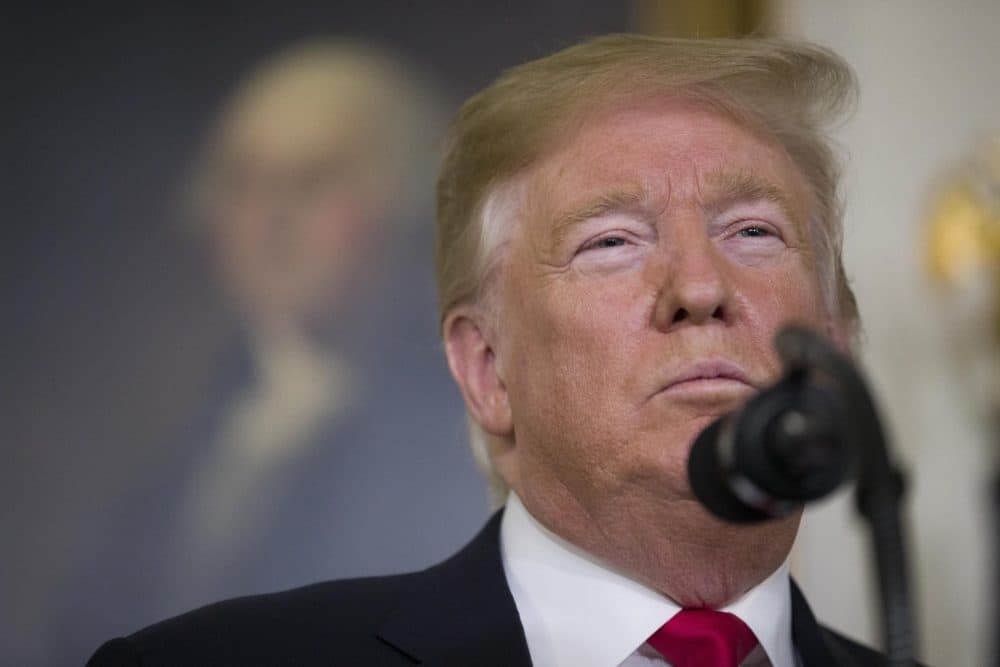Advertisement
Commentrary
Comedy In The Age Of A Humorless President

President Donald Trump has called “Saturday Night Live” a Democratic spin machine that “can’t be legal” and “should be tested in courts.” Over the past year, we’ve seen comedians — including Roseanne Barr and Kevin Hart — lose jobs over tweets. Meanwhile, migrant children are being held in cages by our government and dying in our custody.
Trump’s tenure was supposed to be “good for comedy,” but in reality, it’s been anything but. The calls for resignation that erupt so easily when comedians tell a joke, don’t seem to come as quick when we’re talking about real policies. It begs the question: why?
In a moment when our political reality is best described as bananas, many of us suffer news fatigue. We keep expecting Trump to be held accountable for his actions, his inaction, his words (and tweets) but again and again he does or says something that would be disqualifying for any other president in history, everyone gets up in arms and ... nothing happens. The cycle continues. Those of us watching this unfold have a build-up of emotion. We need the release — which is to say, we desperately need the services provided by comedians.
Comedy and politics have long been strange bedfellows, from the court jesters of medieval times to the comic actors of ancient Rome, from the playwrights of classical Greece to current satirists. The best comedians are, in essence, funny anthropologists who get us to look critically at the world around us by pointing out the things we don’t (want to) pay attention to. Comedians tell us hard truths through a soft medium — and because humor is the vehicle they use to make their points, we are more likely to go along for the ride.
U.S. presidents have long been punchlines. Dana Carvey’s famous “not gonna do it” impersonation of George H.W. Bush resulted not in calls for legal action but rather in an actual call — on camera — from the former president himself who gamely appeared during Carvey’s “SNL” monologue in 1994. Over a decade later, President George W. Bush, appeared alongside his own comedic impersonator in 2006. Republican vice presidential nominee Sarah Palin showed that she could laugh at Tina Fey’s legendary impersonation of her on “SNL” in 2008.
And who could forget that glorious moment in 2015 when Obama welcomed "Luther," his anger translator, played by Keegan-Michael Key, to share the stage with him.
These politicians understood that playing along with comedians humanizes and endears them to the people — it also removes the subversive power of the joke itself.
We live in a cultural moment when the occupant of the White House is actively seeking to squash civic participation and anything that brings social critique to the masses is seen as inherently threatening. That's where comedians have the edge over other public intellectuals: their mediums are not the ivory tower classrooms or the high-brow small-print magazines — theirs is Twitter and YouTube and television. Their ideas and platforms are accessible by design and because they make us laugh, we are more likely to rewatch and reshare and spread their ideas across our social networks. And that is precisely why we are seeing an increase in the policing of comedy, because that type of engagement is dangerous to those who don’t want us paying attention.
Both Chris Rock's and Dave Chappelle's recent Netflix specials tackled the murders of black men and black boys by white policemen in ways that were shocking, and somehow hilarious. It feels wrong to laugh at these jokes, but that's the point — discomfort should come from the fact these men and boys were slain by those who were supposed to protect them, and who will ultimately serve little to no time for their deaths. There are important scholars and activists talking about this issue, but none will get the attention that Rock or Chappelle did.
... if we lose the comedians, we lose the voices helping us make sense of our world in ways that keep us engaged and laughing.
While hardline conservatives and the alt-right yell about freedom of speech, they are quick to come for the comics who exercise that very right. Witness the brutal attacks on Michelle Wolf after her (brilliant) White House Correspondents' Dinner monologue, where the right strategically (mis)used feminist analysis so successfully that not only did the White House Correspondents' Association issue a statement criticizing Wolf, this year's dinner will be the first in three decades to not be hosted by a comedian.
Conservatives love to lament and overstate our politically correct culture where “you can’t say anything anymore.” But that’s just not true. Some people can’t say anything while (ahem) others can talk about grabbing “pussy” and “s---hole countries” with impunity. Those talking about freedom of speech out of one side of their mouths while lambasting our joke tellers with the other are following a message that has been set at the very top (which has become rock bottom).
When the president threatens comedians with legal action, we need to stand up for the stand-ups, because if we lose the comedians, we lose the voices helping us make sense of our world in ways that keep us engaged and laughing.
Trump isn’t the first president to get roasted by comedians, he’s just the first to not play along. And you know what they say — if you can’t take a joke, get out of the White House.



